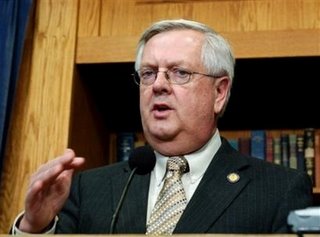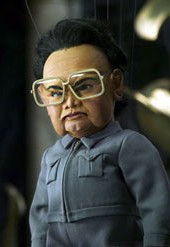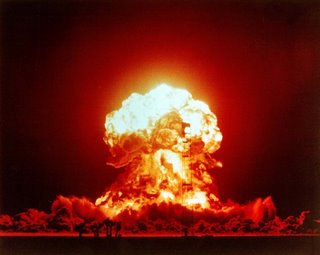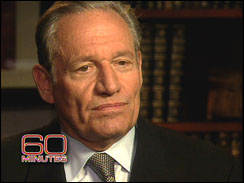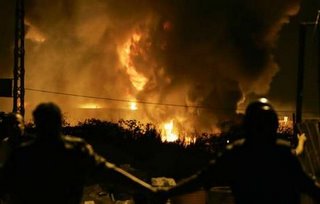I recently wrote this
fact check/editorial piece for the Daily Trojan on ABC's controversial miniseries
"The Path to 9/11." For the sake of brevity, I was unable to dissect each scene and cite sources as in depth as I would have liked. So as a companion to that, I've posted my research with source information in this entry.
Unless otherwise mentioned, my main sources of research were:
The 9/11 Commission ReportSteve Coll, "Ghost Wars: The Secret History of the CIA, Afghanistan, and bin Laden from the Soviet Invasion to September 10, 2001."Richard Clarke, "Against All Enemies: Inside America's War on Terror."Movie: In the most controversial scene of the movie, a CIA operative and Northern Alliance fighters in Afghanistan had Osama bin Laden in their sights, but aborted the mission after a phone call with Clinton National Security Advisor Sandy Berger.
Reality: Both Berger and Clinton/Bush counterterrorism czar Richard Clarke sharply dispute this scene. There is no evidence that the CIA at any point had Osama bin Laden in their sights to call in an air strike.
The original cut of the movie had Berger hanging up the phone before the CIA team decided to abort the mission. This scene was cut before Berger hangs up the phone. However, an anti-Berger/anti-Clinton comment [“Are there any men left in Washington or are they all cowards?”] by Northern Alliance leader Ahmed Shah Massoud was left in the movie.
According to the 9/11 Commission, the decision to abort the operations which were never carried out were ultimately based on the recommendations of CIA Director George Tenet, not Berger. Because this never happened, a scene in the movie a few minutes after the August 1998 bombings on the East Africa embassies where a CIA analyst tearfully barges into a conference room and blasts George Tenet for not ordering the strike on bin Laden shown in the movie is also inaccurate.
The following is a timeline of attempts during the Clinton Administration to capture or kill Osama bin Laden, as documented by the 9/11 Commission:
Fall of 1997: The CIA draws up preliminary plans to capture bin Laden alive.
June 1998: The CIA plans a raid to capture bin Laden for June 23, with intentions of getting him out of Afghanistan within four weeks. Although the plan was never presented to the White House for a decision, this operation was aborted by CIA Director George Tenet at the recommendation of his operations officers.
August 1998: After the East Africa embassy bombings in August, the Clinton Administration retaliates with missile strikes in Afghanistan and Sudan with the intention of killing bin Laden.
September-October 1998: Afghan assets of the CIA claim they attempted to ambush Bin Laden four times with the intention of capturing him alive, with no success.
December 1998: Senior officials decide against recommending another missile strike against bin Laden after getting a possible lead on his location. Clinton later modifies his previous order, authorizing the Afghan assets to kill bin Laden if capturing him was not possible.
February 1999: Intelligence indicating bin Laden’s presence at a camp in Afghanistan. The proposed missile strike is eventually called off after discussions with Tenet who felt the intelligence was unreliable.
May 1999: Several CIA assets report on bin Laden’s location over a period of five days. Berger believes Tenet made the decision against the strike.
The 9/11 Commission considered this “perhaps the last, and most likely the best” opportunity to target bin Laden with a missile strike before 9/11. No missile strikes against bin Laden were considered again until after 9/11.
[Sources: 9/11 Commission, p. 108-121, 126-143. Coll, p. 371-396, 410-412, 421-28, 445-450. Clarke, p. 148-154, 188-190, 199-204.]
Movie: The CIA spotted Osama bin Laden while testing a prototype for an unmanned aerial vehicle.
Reality: This is true, although the depiction in the movie is highly exaggerated. In the movie, it took place after the USS Cole bombing.
Steve Coll and the 9/11 Commission reported that the CIA began a series of test flights on the Predator in September of 2000 continuing for several months. The CIA spotted a man believed to be bin Laden two or three times while testing unmanned Predator drones equipped with video cameras. Ten of the fifteen test flights were considered successful, according to the 9/11 Commission.
The video footage of bin Laden seen in the film is also grossly exaggerated, showing near perfect and clear color images of him in a training camp. The
actual footage, which was leaked to
NBC News approximately two years ago, was grainier and shot from a much greater distance than the footage shown in the movie.
The film is inaccurate showing that a Predator was lost during the test run after an encounter with a Taliban jet. A jet was scrambled to intercept the Predator during one test flight but it flew by the Predator without even seeing it. On one occasion, a plane crash landed shortly after takeoff. This resulted in a bureaucratic turf war between the CIA and the Air Force over who was going to get stuck with the repair bill for the $3 million plane.
The film is accurate when it says the planes were not weaponized at the time, so were not used to attempt to kill bin Laden. Since 9/11, Predator drones have been armed with Hellfire missiles and used in at least two operations to assassinate al Qaeda operatives.
[Sources: 9/11 Commission, p. 187-190. Coll, p. 520-531. Clarke, p. 220-222. NBC News,
"Osama bin Laden: Missed Opportunities."]
Movie: Condoleezza Rice reads the August 6, 2001 Presidential Daily Brief (PDB) warning, “Bin Laden Determined to Strike in U.S.”
Reality: Rice testified before the 9/11 Commission that the PDB contained "historical information based on old reporting," "no new threat information," and that it did not "warn of any coming attacks inside the United States." Her characterization of the PDB, which was
first revealed by the Washington Post and later
declassified at the request of the 9/11 Commission, is accurate.
The 9/11 Commission also noted that this was the 36th PDB item that year which was related to bin Laden or al Qaeda, and the first devoted to a possible attack in the United States.
The movie does not depict President Bush receiving this briefing. According to
Ron Suskind’s book “The One Percent Doctrine,” after he was given this briefing by a CIA officer while on vacation at his Crawford ranch, President Bush responded, “All right, you’ve covered your ass, now.”
[Sources: 9/11 Commission, p. 260-263.
Transcript of Condoleezza Rice's testimony before the 9/11 Commission. Suskind, p. 1-2]
Movie: While chairing the Bush Administration's first principals meeting on terrorism on September 4, 2001, Condoleezza Rice says, "Morning, gentlemen. As a result of the August 6 Presidential Daily Briefing, the president is tired of swatting flies. He believes Al Qaeda is a real threat, and he wants to consider real action. He specifically asked about the armed Predator. Where are we with that?"
Reality: Condoleezza Rice and others recalled the President saying "I'm tired of swatting at flies," and also reportedly said "I'm tired of playing defense. I want to play offense. I want to take the fight to the terrorists," in early March of 2001, according to the 9/11 Commission Report.
Regarding the Predator, Richard Clarke and CIA Counterterrorism official Cofer Black were early and vocal proponents of the program, especially a weaponized version of it. There is some dispute whether there was an endorsement of resuming flights during an April 30, 2001 meeting, but Rice and her deputy Stephen Hadley ultimately "went along with the CIA and the Pentagon, holding off on reconnaissance flights until the armed Predator was ready," according to the 9/11 Commission. The Commission also reported that Hadley tried to hurry the development of the armed Predator, directing Deputy CIA Director John McLaughlin, Deputy Secretary of Defense Paul Wolfowitz, and Joint Chiefs Vice Chairman Richard Myers to "deploy Predators capable of being armed no later than September 1."
The Principals Committee had its first meeting on al Qaeda, chaired by Condoleezza Rice, on September 4, 2001. Clarke sent Rice a memo that day which reads, "are we serious about dealing with the al Qida threat?...Is al Qida a big deal?...Decision makers should imagine themselves on a future day when the CSG has not succeeded in stopping al Qida attacks and hundreds of Americans lay dead in several countries, including the US."
After being briefed by her staff that the weaponized Predator was not ready for deployment, Rice commented about potential for using it in spring of 2002.
[Sources: 9/11 Commission p. 202, 210-213. Clarke, p. 237-238.]
Movie: Ahmed Shah Massoud warns the CIA that an operation is underway in the United States involving aviation hijackings shortly before he is assassinated.
Reality: There is no evidence that Massoud ever warned the CIA about the 9/11 plot, although in the movie he is shown using alarmist language about the plot, noting that it would happen in the United States and would involve aviation hijackings. However, during a press conference in France on April 5, 2001, he warned "If President Bush doesn’t help us, then these terrorists will damage the United States and Europe very soon – and it will be too late."
[Source: Coll, p. 555]
Movie: 9/11 hijacker Mohammed Atta sets off red flags when trying to check in for his American Airlines flight at Logan International Airport in Boston.
Reality: Atta was screened by U.S. Airways employees in Portland, Maine after being selected by a computerized pre-screening system, not American Airways employees in Boston. However, three other members of Atta’s hijacking team were chosen for screening at Logan. All five members of the Atta team cleared the security checkpoint and were able to board their flight. American Airlines has issued a press release calling this scene "inaccurate and irresponsible," and according to
Ad Week, is said to be considering legal action against ABC and pulling all of its advertising from the network.
[Source: 9/11 Commission, p. 1-2]
Movie: Vice President Cheney has a conversation with President Bush the morning of 9/11 where the President gives him the order to shoot down hijacked planes.
Reality: The 9/11 Commission was unable to find any conclusive evidence that this phone call ever took place. From the report:
Among the sources that reflect other important events of that morning, there is no documentary evidence for this call, but the relevant sources are incomplete. Others nearby who were taking notes, such as the Vice President's chief of staff, Scooter Libby, who sat next to him, and Mrs. Cheney, did not note a call between the President and Vice President immediately after the Vice President entered the conference room.
Vanity Fair recently obtained the entire unedited NORAD tapes from 9/11 and did an extensive analysis of the contents. The magazine reported, "President Bush would finally grant commanders the authority to give that order [to shoot down the planes] at 10:18, which—though no one knew it at the time—was 15 minutes after the attack was over."
Richard Clarke, who was in a different room of the White House than the Vice President and Condoleezza Rice when this happens, remembers getting a message relayed to him by a military aide saying "Tell the Pentagon they have authority from the President to shoot down hostile aircraft, repeat, they have authority to shoot down hostile aircraft." What is not clear from his narrative is at what time he got this message ordering to shoot down the planes, before or after the 10:18 time reported in Vanity Fair.
[Sources: 9/11 Commission Report, p. 40-42.
Vanity Fair "9/11 Live: The NORAD Tapes." September 2006 issue, p. 262-285. Clarke, p. 1-8]

